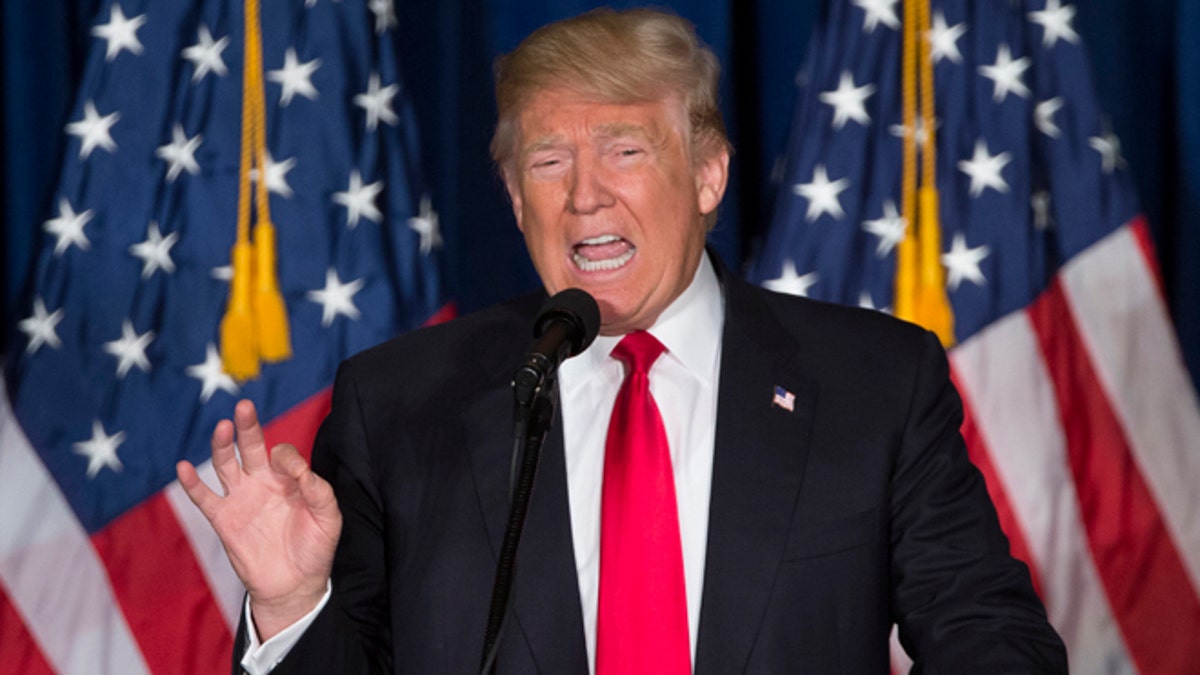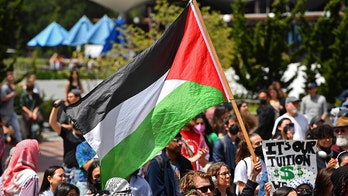
Republican presidential candidate Donald Trump gives a foreign policy speech at the Mayflower Hotel in Washington, Wednesday, April 27, 2016. Trump's highly anticipated foreign policy speech Wednesday will test whether the Republican presidential front-runner, known for his raucous rallies and eyebrow-raising statements, can present a more presidential persona as he works to unite the GOP establishment behind him. (AP Photo/Evan Vucci)
The Donald Trump campaign continued railing against the judge who is presiding over the fraud case against the mogul’s university, linking his past membership in a Latino lawyers’ group as a reason to doubt his objectivity.
Trump spokeswoman Katrina Pierson on Monday said that Judge Gonzalo Curiel had been member of a group that has been overtly against her candidate.
"I think what's really interesting about this particular judge — as Mr. Trump refers to him as a 'Trump hater' — is he even mentions on his judicial questionnaire that he was a La Raza Lawyers Association member," Pierson said in an interview on CNN.
Trump has been trying to get Curiel off the fraud case against Trump University since 2014.
At a campaign rally on Friday in San Diego, Trump denounced Curiel’s handling of the case, which involves two class action suits that accuse Trump University of deceptive practices against customers who were promised insight into the mogul’s strategies for succeeding in real estate.
The lawsuit overseen by Curiel states that Trump University's nationwide seminars and classes were like infomercials and pressured students to buy more but didn't deliver as promised in spite of students paying as much as $35,000 for seminars.
The Washington Post reported that Curiel's order to release an estimated 1,000 pages of Trump University-related documents cites heightened public interest in Trump and that he had "placed the integrity of these court proceedings at issue." The judge appeared to reject the argument by Trump attorneys that the information had commercial value, saying that there was no support for the assertion that Trump University may resume operations.
Trump assailed the judge’s scheduling for a trial to begin in November. The candidate already was displeased with Curiel's decision last year to accept the court complaints against Trump University as class-action suits.
"The trial is going to take place sometime in November,” Trump said at the rally. “There should be no trial. This should have been dismissed on summary judgment easily, everybody says it. But I have a judge who is a hater of Donald Trump, a hater. He's a hater.”
"The judge, who happens to be, we believe, Mexican, which is great. I think that's fine."
It was the second time this year Trump tried to link the judge's ethnicity to his ability to be impartial in the case. In February, Trump said in an interview on "Meet the Press" that Curiel's Hispanic heritage was a reason the judge was not ruling in his favor in the case.
The judge was born and raised in Indiana. His parents came from Mexico, according to various published reports.Pierson defended Trump’s comments, which many later criticized as unfair and bigoted, saying the judge’s ethnicity was irrelevant and should not have been singled out. She also questioned the judge’s involvement with the National Council of La Raza, a national civil rights group.
"This is an organization that has been out there organizing anti-Trump protesters with the Mexican flags,” Pierson said, “they are pushing it. The signs have been very apparent. And so Mr. Trump is just stating the obvious."
Trump has attacked Mexico as a country that dumps drug dealers and other criminals along the U.S.-Mexico border. A cornerstone of his campaign has been that he will crack down on illegal immigration. He has vowed to build a huge wall that he says he will force Mexico to fund, and also has vowed to have a mass deportation to expel the estimated 11 million undocumented immigrants living in the United States.
The CNN interviewer told Pierson that the judge is American-born.
Pierson said she was not sure of his ethnic origin, but argued that it was relevant.
"Well, it's because of what we see outside of these rallies, these anti-Trump rallies, these criminal rallies, these criminal protesters out there defacing property and attacking police officers," Pierson said. "They're doing so under the guise of an anti-Trump protest, with their Mexican flags, and La Raza and this judge is connected to that."
Curiel is not permitted to address Trump’s attacks.
He has said only that during the civil case against Trump University, the mogul has become a leading presidential candidate who “placed the integrity of these court proceedings at issue.”
Earlier in his career, Curiel prosecuted drug smugglers and cartel leaders, a mission that made him a target of assassination attempts and required him to live under tight security.
In 1997, for example, a gunman for a Tijuana drug cartel spoke in a bugged conversation of being willing and able to arranged Curiel’s murder, according a Los Angeles Times story from that year.
A 2002 New York Times story credited Curiel with being one of the key figures in one of the U.S.’s most important victories in the fight against drug smuggling across the border.
As a chief drug prosecutor in the late 1990’s, Curiel and other law enforcement officials in California of Mexican descent were able to use their Spanish-language skills and knowledge of the culture to win the trust of their police counterparts in Mexico and identify the corrupt officials who were sabotaging U.S.-Mexico efforts to crack down on the drug cartels.
“According to participants on both sides, the Mexicans looked across the table at Mr. Chavez, Mr. Vega and Mr. Curiel, all born of Mexican parents, and the spark of recognition lit a fire,” the Times story said.
''It couldn't but help,'' Mr. Curiel said to the Times in 2002. ''We were working without the disconnect of interpreters and barriers of culture. When it comes down to it, this involves the country of our parents.''
The Associated Press contributed to this report.
Like us on Facebook




